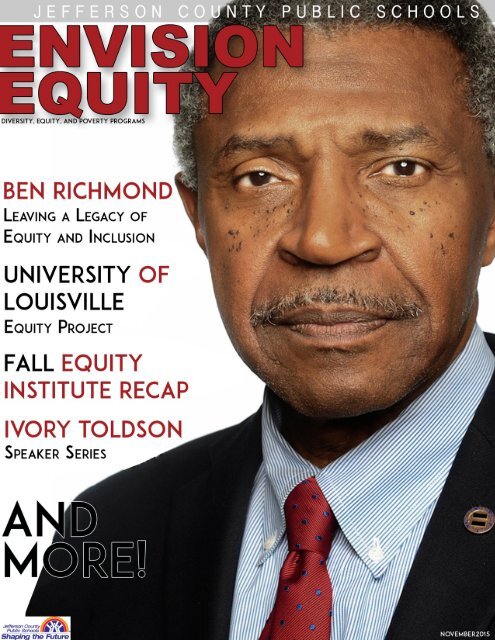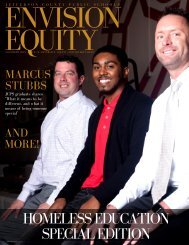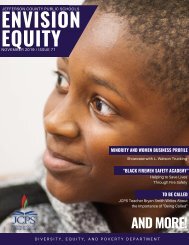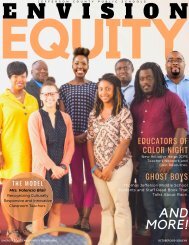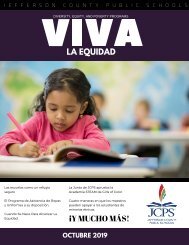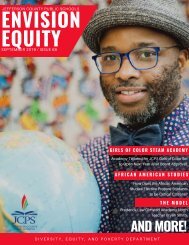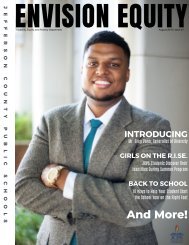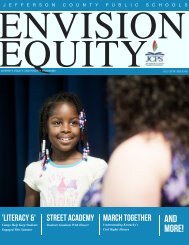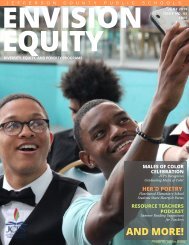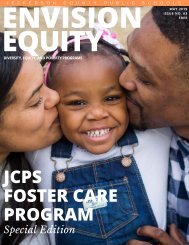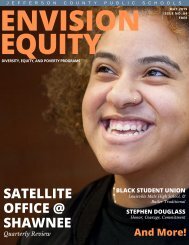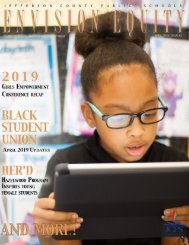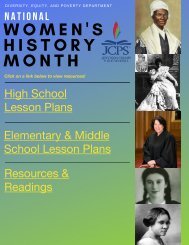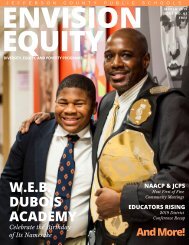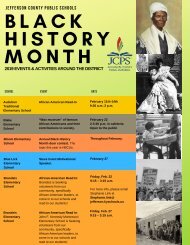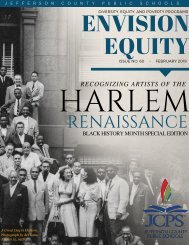ENVISION EQUITY Nov2015_Lowres
You also want an ePaper? Increase the reach of your titles
YUMPU automatically turns print PDFs into web optimized ePapers that Google loves.
1
Ben Richmond: Leaving a Legacy of Equity and Inclusion<br />
<strong>ENVISION</strong> <strong>EQUITY</strong> NOVEMBER 2015<br />
Photos, Abdul Sharif<br />
Above, Ben Richmond speaks during his retirement celebration.<br />
Donna M. Hargens, Superintendent<br />
There has never been a<br />
time that Ben Richmond<br />
refused to support Jefferson<br />
County Public Schools<br />
(JCPS). His fidelity to public<br />
education and JCPS has<br />
been a true support to me. I<br />
could call Ben and know<br />
that I would receive candid<br />
advice and unwavering<br />
support. It is Ben’s love for<br />
JCPS and all of the<br />
students that I will always<br />
admire. He is truly<br />
unmatched.<br />
Although Ben has handed the reigns to another great person,<br />
Sadiqa Reynolds, who I look forward to working with, I know<br />
I will still see Ben in our schools, in the community, and at<br />
board meetings. Because, like he always told me, “We’ve got<br />
work to do.”<br />
Ben, thank you for being a part of making Louisville a home<br />
for me. I respect you immensely and wish you nothing but the<br />
best in this new chapter of your life.<br />
Regardless of the<br />
news–either good<br />
or bad, I learned<br />
early that I needed<br />
to know where Ben<br />
Richmond stood<br />
on an issue. Ben<br />
sees through a lens<br />
of inclusion and<br />
equity. When we<br />
celebrated<br />
successes, he was<br />
right there with us;<br />
however, he would remind me that there is more to do. It is<br />
that simple with Ben. He modeled what he said, “There is<br />
always work to do.” I always say that I refuse to quit on the<br />
kids of JCPS. Leaders like Ben Richmond will make sure we<br />
never quit. Ben, and leaders like him, have made this city the<br />
most welcoming city imaginable.<br />
Congratulations and job well done, friend.<br />
Donna M. Hargens<br />
Superintendent<br />
Continued on next page<br />
2
<strong>ENVISION</strong> <strong>EQUITY</strong> NOVEMBER 2015<br />
Photo, Mayor’s Office<br />
On October<br />
1, Ben<br />
Richmond<br />
retired from<br />
the Louisville<br />
Urban<br />
Sadiqa N. Reynolds, Esq.<br />
League, after<br />
serving as<br />
president and CEO for 29 years.<br />
Growing up in Mississippi in the 1950s<br />
and early 60s, Ben lived through<br />
segregation and knew firsthand the<br />
struggles of Blacks in the south and<br />
throughout this country. He witnessed<br />
the civil rights movement and knew early<br />
on that he wanted to make a difference.<br />
He has.<br />
I look forward to picking up<br />
where Ben left off and<br />
pushing forward in a way<br />
that advances equity in<br />
education and meets the<br />
challenges of today and the<br />
future with courage and<br />
innovation.<br />
Sadiqa N. Reynolds, Esq.<br />
Ben worked to create the 15K Degrees<br />
Initiative because he believed that<br />
education is key to the success of any<br />
people. The15K Degrees Initiative aims<br />
to create an education movement within<br />
the African-American community that<br />
advances a college-going and degreecompletion<br />
culture and ultimately leads<br />
to increases in the number of college<br />
graduates in our midst by 2020.<br />
During Ben’s tenure, the Louisville<br />
Urban League has worked to solidify the<br />
relationship with JCPS, recognizing that<br />
no one institution is responsible for the<br />
success or failure of any of our children.<br />
We all play a role. Under Ben’s<br />
leadership, the Louisville Urban League<br />
has created and expanded the Street<br />
Academy Program, providing a literacyrich<br />
curriculum for fourth-grade and<br />
fifth-grade boys. In addition, the Project<br />
Ready Program has prepared hundreds<br />
of students to graduate high school<br />
college- and career-ready.<br />
I look forward to picking up where Ben<br />
left off and pushing forward in a way that<br />
advances equity in education and meets<br />
the challenges of today and the future<br />
with courage and innovation. Ben will<br />
continue to be a valuable asset in our<br />
community and those of us here at the<br />
League hope that you will join us in<br />
saluting him for his lifelong commitment<br />
to making the world better for us all.<br />
Sadiqa N. Reynolds, Esq.<br />
President & CEO<br />
Louisville Urban League<br />
JCPS Religious Observances Calendar<br />
By Dr. Monica Lakhwani—Diversity/Multicultural Education Specialist, JCPS Department of Diversity, Equity, and Poverty Programs<br />
JCPS as a school community values academic and extracurricular activities. Furthermore, as a school community, we value religious<br />
diversity. Those who schedule school district activities should be mindful of the diverse religious observances of community members<br />
and parents at large. The scheduling of academic or extracurricular events on major religious holidays should be avoided whenever<br />
possible.<br />
Educators are expected to be mindful of potential conflicts with religious observances. Provided below is a link to the 2015-16<br />
religious observance calendar. This calendar lists significant holidays from the largest global faith traditions. Please note, holidays for<br />
some faiths are associated with a solar/lunar calendar or cultural pattern. Hence, some dates for holidays may vary by year.<br />
http://www.jefferson.kyschools.us/Programs/mcconnections/calendar.html<br />
The Department of Diversity, Equity, and Poverty Programs encourages all educators to review the link above out of respect for<br />
diverse faith traditions. Additionally, we encourage principals to view the resource in their Principal’s Planner (starting on page 49) and<br />
share it with school staff.<br />
3
<strong>ENVISION</strong> <strong>EQUITY</strong> NOVEMBER 2015<br />
Developing an Equity Responsive Climate: Enhancing Instructional Capacity to<br />
Increase Student Learning<br />
By Gaëtane Jean-Marie, Ph.D.—University of Louisville Department of Educational Leadership Chair and Professor<br />
U.S. public education systems have<br />
experienced a rapid growth in ethnic,<br />
racial, socioeconomics, linguistics, and<br />
culture, evidencing the changing faces of<br />
P-20 student populations (Milner, 2013;<br />
Sundstrom, 2008; Sanchez, Thornton, &<br />
Usinger, 2008). Specifically, educational<br />
settings represent the diversity that is<br />
manifested in an increasingly<br />
multicultural world (Samuels, 2014).<br />
Scholars increasingly document the<br />
Gaëtane Jean-Marie, Ph.D.<br />
importance of addressing the needs of<br />
culturally, linguistically, and economically diverse students and<br />
their families (Hogan, 2012; Jones & Nichols; 2013). Yet despite<br />
the shifting demographic landscape, the cultural framework of<br />
P-12 education system remains firmly aligned with middle-class<br />
values, preferences, and practices (Sanchez, Thornton, & Turner,<br />
2015; Sundstrom, 2008;). Further, many educators believe they<br />
are adequately prepared in teacher education and leadership<br />
preparation programs to build cultural inclusiveness in the<br />
classroom and within the educational context. However, what is<br />
evident is the “significant number of children within racial and<br />
ethnic subgroups who become disinterested in, disengaged from,<br />
and drop out of school at an alarming rate, particularly in racially<br />
and ethnically diverse urban school settings (Jones & Nichols,<br />
2013, p. 2).” Moreover, racial disparities in achievement and the<br />
administration of school discipline continue to plague our<br />
nations’ schools (Turner, 2015).<br />
A driving force for change is a sense of urgency to refocus<br />
agendas and resources, and establish innovative policies to<br />
respond to demographic shifts (Kotter, 2008; Milner, 2013;<br />
Turner, 2015). Coupled with the fact that our nation’s schools are<br />
becoming increasingly diverse, we argue that the sense of urgency<br />
could not be higher, especially when urban students’ success is<br />
directly connected to the future long-term health of the U.S. The<br />
educational system and its stakeholders need to make a paradigm<br />
shift in thinking and practices about how to educate students.<br />
Policymakers, practitioners, parents, and the community at large,<br />
while they may disagree about how to reform schools in response<br />
to increased diversity, agree that the “quality of leadership of<br />
schools matters to how children mature, develop and achieve, and<br />
to their future life chances” (Lumby, Crow and Pashiardis, 2008,<br />
p. xv). Further, the cultural competence of school leaders and<br />
teachers is essential to creating a school climate that understands<br />
and values learners who come from a wide range of cultures,<br />
ethnicities, and socioeconomic status. Yet, there is little<br />
understanding on the formation of organizational cultural<br />
competence in schools.<br />
As part of a longitudinal study, the UofL/JCPS Equity<br />
Responsive Climate project probes school leaders and teachers’<br />
understanding of cultural competence. An equity responsive<br />
climate (ECR) seeks to establish an organizational cultural<br />
competence in schools that brings together leaders and teachers<br />
who have the collective power to change the instructional<br />
environment for diverse learners. ECR, a latent construct is a<br />
triadic process that is premised on the affective, cognitive, and<br />
behavior engagement domains of cultural competence (Jones &<br />
Nichols, 2013; Koth, Bradshaw & Leaf, 2008). This is an<br />
information-gathering research project, designed to gather data<br />
on cultural competence, climate and culture, instructional<br />
capacity, learning conditions’ perceptions directly from<br />
principals/assistant principals, teachers, students, and parents.<br />
This project will help guide professional development provided to<br />
administrators on cultural competence and inform JCPS district<br />
and site-level priority setting.<br />
There are three overarching research foci. The first is to<br />
understand school leaders’ and teachers’ perceptions of cultural<br />
competence and develop an equity responsive climate instrument.<br />
Perspectives of principals and teachers will help JCPS construct<br />
processes and structures to lay the foundation for developing and<br />
nurturing an equity responsive climate in schools to meet the<br />
needs of diverse learners. The second is to examine the ways in<br />
which school leaders and teachers engage in cultural competence<br />
practices to enhance instructional and student capacity through<br />
the diffusion of an equity responsive climate. Digging deeper<br />
through diffusion theory, perspectives from teachers, students,<br />
parents and administrators will provide insights on ERC’s effect<br />
on learning conditions, and achievement. Within year one and<br />
two, school leaders and teachers will engage in participatory<br />
action research to develop the wealth of knowledge and expertise<br />
that help to create an equity responsive climate to enhance<br />
teaching and learning. Lastly, the purpose is to measure the<br />
relationship between instructional capacity, equity responsive<br />
climate, and learning conditions. The focus is on the spread of<br />
the reform (i.e., equity responsive climate) to support the needs of<br />
diverse learners. The UofL/JCPS Equity Responsive Climate<br />
project will add value to practitioners working within urban<br />
settings because today’s school leaders and teachers must be better<br />
equipped to address academic inequalities found within racially<br />
and ethnically diverse schools. Specifically by sharing perceptual<br />
understandings of the factors associated with an equity responsive<br />
climate, this research project provides those working within the<br />
urban context a glimpse into the efforts of JPCS seeking to better<br />
prepare culturally competent leaders and teachers. The research<br />
team includes: Dr. Gaëtane Jean-Marie, Dr. Bradley Carpenter,<br />
Dr. Tia Dumas, Dr. Jason Immekus and Dr. Lisa Hooper (UofL),<br />
and Dr. Daniel Spikes –Iowa State University).<br />
References<br />
Hogan, M. (2012). The four skills of cultural diversity competence. Cengage Learning.<br />
Koth, C. W., Bradshaw, C. P., & Leaf, P. J. (2008). A multilevel study of predictors<br />
of student perceptions of school climate: The effect of classroom-level<br />
factors. Journal of Educational Psychology, 100(1), 96.<br />
Kotter, J. P. (2008). A sense of urgency. Boston, MA: Harvard Business Press.<br />
Jones, B. A., & Nichols, E. J. (2013). Cultural Competence in America's Schools:<br />
Leadership, Engagement and Understanding. Charlotte, NC: IAP–Information Age Pub.<br />
Inc.<br />
Lumby, J., Crow, G., Pashiardis, P. Eds. (2008). International handbook on the<br />
preparation and development of school leaders. New York: Routledge.<br />
Milner IV, H. R. (2013). Start where you are, but don't stay there: Understanding diversity,<br />
opportunity gaps, and teaching in today's classrooms. Harvard Education Press.<br />
8 Story Street First Floor, Cambridge, MA 02138.<br />
Samuels, D. R. (2014). The culturally inclusive educator: Preparing for a<br />
multicultural world. New York: Teachers College Press.<br />
Sanchez, J., Thornton, B., & Usinger, J. (2008). Promoting diversity in public<br />
education. Promoting diversity within public education leadership.<br />
International Journal of Educational Leadership Preparation, 3(3), 1–10.<br />
Available: http://cnx.org/content/m18745/latest<br />
Sundstrom, R. R. (2008). The browning of America and the evasion of social justice. State<br />
University of New York Press.<br />
Turner, E. O. (2015). Districts’ responses to demographic change: Making sense of<br />
race, class, and immigration in political and organizational context.<br />
American Educational Research Journal, 52, (1), 4-39.<br />
4
<strong>ENVISION</strong> <strong>EQUITY</strong> NOVEMBER 2015<br />
Rocketing All Students Toward Success: JCPS Third-Grade Reading Pledge<br />
By Karen E. Branham—Assistant Superintendent of Curriculum and Instruction<br />
Above, Jacob Elementary School teacher Felicia Ellingsworth, works with a group of students.<br />
Photos by Jonathan Roberts<br />
In<br />
elementary<br />
classrooms<br />
across<br />
JCPS,<br />
teachers<br />
are<br />
changing<br />
the way<br />
they teach<br />
students<br />
how to<br />
read.<br />
Karen E. Branham<br />
Building<br />
teacher capacity using researched-based<br />
literacy practices is one strategy of an<br />
initiative in JCPS called the Third-<br />
Grade Reading Pledge. JCPS is<br />
organizing a communitywide effort to<br />
create a system of academic services<br />
and supports to ensure that each and<br />
every student is reading on or above<br />
grade level by the end of third grade.<br />
The initiative is focused on closing the<br />
opportunity gap in literacy for all<br />
children. Research shows that some<br />
students start school with as much as a<br />
30 million-word gap. Not all students<br />
come to school from homes where a<br />
parent or family member cultivates<br />
their learning nor do they come from<br />
homes that have plenty of print-rich<br />
material. Many of our youngest<br />
learners come to school “not ready to<br />
learn” because of challenges like<br />
poverty, unmet medical needs, broken<br />
homes, crime, abuse, and other barriers<br />
to learning.<br />
Several of the most promising<br />
collaborations that will help our<br />
community make sure all students are<br />
reading on grade level by the end of<br />
the third-grade include the JCPS-<br />
Bellarmine Literacy Project, the<br />
University of Louisville (UofL)-<br />
JCPS Early Literacy Project,<br />
Kindergarten-Readiness Camps,<br />
the Early Grade Summer Reading<br />
Program for English Language<br />
Learners (ELLs), and the Summer<br />
Literacy Boost program. In addition,<br />
JCPS partners with the Louisville Free<br />
Public Library (LFPL), which offers<br />
numerous programs and incentives that<br />
support the Third-Grade Reading<br />
Pledge.<br />
The UofL-JCPS Early Literacy<br />
Project is focused on developing<br />
qualified, knowledgeable Primary<br />
literacy teachers. Teachers become<br />
learners and researchers who study<br />
their own literacy practices as they<br />
support young children’s progress to<br />
reading proficiency. Teachers<br />
participate in coursework, a summer<br />
institute, meetings, and conferences<br />
while they increase their understanding<br />
of the reading process and contentrich,<br />
culturally responsive, inquirybased<br />
learning.<br />
Kindergarten-Readiness Camp is<br />
a summer program targeting some of<br />
our most at-risk incoming kindergarten<br />
students. The goal of the camps is to<br />
boost kindergarten readiness by<br />
providing additional time and support<br />
for student learning. During the<br />
summer of 2015, Kindergarten-<br />
Readiness Camps at three Early<br />
Childhood Program locations served<br />
approximately 300 incoming<br />
kindergartners. Students attend camp<br />
five days a week, take part in programs<br />
for 5 1/2 hours each day, and receive<br />
breakfast and lunch. Pre- and postassessments<br />
monitor student progress<br />
during the camp, and participating<br />
students take the BRIGANCE<br />
Kindergarten-Readiness Screen as they<br />
enter kindergarten. Results show that<br />
students participating in the camps<br />
have increased kindergarten-readiness<br />
levels as much as 20 percent on the<br />
BRIGANCE Kindergarten-Readiness<br />
Screen.<br />
The Early Grade Summer<br />
Reading Program for ELLs<br />
provides continuous reading support<br />
and boosts reading achievement for<br />
kindergarten through second-grade<br />
ELLs who have been in school for at<br />
least six months and are reading below<br />
grade level.<br />
Each program site has four English as a<br />
Second Language (ESL) teachers and<br />
four bilingual associate instructors<br />
(BAI). Students are placed in<br />
classrooms based on their text level.<br />
ESL teachers and BAIs use the Leveled<br />
Literacy Intervention kits as the<br />
curriculum with supplemental<br />
materials.<br />
Continued on next page<br />
5
<strong>ENVISION</strong> <strong>EQUITY</strong> NOVEMBER 2015<br />
The district has offered Summer<br />
Literacy Boost since the summer of<br />
2012. Summer Literacy Boost has<br />
grown from 50 students from 4 schools<br />
in 2012 to 609 students from 51 schools<br />
during the summer of 2014. The<br />
program targets incoming first- and<br />
second-graders. Participating students<br />
receive intense literacy instruction<br />
through a framework that includes<br />
whole-group, small-group, and<br />
individual lessons in strategic processing;<br />
letters/words/phonemic awareness;<br />
interactive/guided reading; interactive/<br />
independent writing; independent<br />
reading; and oral language development.<br />
The program also provides breakfast,<br />
lunch, and transportation for<br />
participating students.<br />
The LFPL supports the Third-Grade<br />
Reading Pledge in many ways.<br />
Highlights of their involvement include<br />
the following programs:<br />
• The 1,000 Books Before<br />
Kindergarten Challenge is<br />
designed to build early literacy<br />
skills by encouraging a love and<br />
habit of reading. More than<br />
17,000 children have enrolled<br />
in the challenge.<br />
• Share 100 Stories Before<br />
Fourth Grade encourages<br />
early elementary students to<br />
read aloud. In 2014-15, all<br />
kindergarten through thirdgrade<br />
students received an ageappropriate<br />
book to keep, and<br />
in 2015-16, all kindergarten<br />
through second-grade students<br />
received a book. Bookmarks<br />
with guiding questions<br />
accompanied each text.<br />
Students were encouraged to<br />
read aloud to others, and free<br />
books were provided to students<br />
who completed the program.<br />
• The Summer Reading<br />
Program promotes preschool<br />
through teen reading in the<br />
summer while providing<br />
incentives for program<br />
completion. A record-breaking<br />
number of participants (30,559)<br />
completed the 2015 Summer<br />
Reading Program.<br />
Finally, the JCPS-Bellarmine<br />
Literacy Project is in its second year of<br />
implementation. During the 2014-15<br />
school year, approximately 200 teachers<br />
from 19 low-performing elementary<br />
schools participated in this collaborative<br />
initiative, which develops and builds<br />
teacher capacity to provide effective,<br />
research-based, culturally relevant<br />
reading instruction to JCPS Primary<br />
students. Teachers at selected schools<br />
participate in graduate-level coursework<br />
and implement their learning in their<br />
own classrooms while being supported<br />
by a school-based coach. While teachers<br />
receive more than 90 hours of jobembedded<br />
training and support,<br />
principals participate in a Principal<br />
Fellowship, which meets twice monthly<br />
to build instructional leadership in<br />
building principals. This year, 38 schools<br />
and more than 500 teachers, coaches,<br />
and principals are participating in the<br />
second cohort of the JCPS-<br />
Bellarmine Literacy Project.<br />
One of the<br />
schools<br />
participating<br />
in the JCPS-<br />
Bellarmine<br />
Literacy<br />
Project for<br />
the second<br />
year in a row<br />
is Jacob<br />
Elementary School. Principal Michael<br />
Terry describes how the project has<br />
supported his leadership at Jacob<br />
Elementary. “My highest priority as an<br />
instructional leader is to close the gap<br />
and increase proficiency levels for all<br />
students. Literacy is an extremely<br />
important part of the learning process.<br />
The Bellarmine Literacy Project is<br />
providing teachers with literacy tools and<br />
strategies to differentiate literacy<br />
instruction and meet each student where<br />
they are. Part of the program involves<br />
accurate assessment of student literacy,<br />
which is imperative as we work toward<br />
proficiency. As teachers are using the<br />
tools in classrooms at Jacob, we are<br />
seeing confident readers emerge and<br />
gains on our district assessment<br />
scores. As a leader, this excites me. My<br />
goal is to see all students perform at their<br />
highest ability. The Bellarmine<br />
Literacy Project brings us one step closer<br />
to achieving that goal.”<br />
Above, Jacob Elementary School teacher<br />
Felicia Ellingsworth<br />
One of the<br />
teachers<br />
participating<br />
at Jacob is<br />
fourth-grade<br />
teacher<br />
Felicia<br />
Ellingsworth.<br />
Ms. Ellingsworth shares how her<br />
participation in the JCPS-Bellarmine<br />
Literacy Project has changed her<br />
classroom instruction and supported<br />
improved levels of student literacy. “The<br />
Bellarmine Literacy Project has<br />
completely changed my idea of literacy<br />
instruction. How literacy is taught,<br />
assessed, and approached is now much<br />
different inside my classroom. I am<br />
learning the importance of creating a<br />
culturally relevant classroom that creates<br />
a holistic approach to literacy. Using<br />
researched-based assessments and<br />
teaching strategies, I have deeply learned<br />
who my students are as readers.<br />
Teaching the five main components of<br />
reading (phonemic awareness, phonics,<br />
fluency, vocabulary, and comprehension)<br />
each day allows my instruction to be<br />
focused on the levels of my learners<br />
instead of a one-size-fits-all style of<br />
teaching. Through using what I have<br />
learned in this project, I have noticed an<br />
increase in engagement, effort, and<br />
academic performance from my<br />
students. In addition, I know exactly<br />
what each of my students needs in order<br />
to boost their literacy knowledge to<br />
create more equipped readers who can<br />
apply a variety of strategies to new<br />
experiences in reading.”<br />
If greater<br />
Louisville<br />
partners<br />
with<br />
JCPS to<br />
get all<br />
students<br />
reading<br />
on grade<br />
level by<br />
the end of<br />
Above, Jacob Elementary School students<br />
read during class.<br />
third grade, we will not only ensure our<br />
students’ immediate success but also<br />
increase graduation and college<br />
completion rates, enhance job<br />
qualifications, reduce discipline and<br />
crime rates, and combat the “school-toprison<br />
pipeline.” We want policies and<br />
practices that do not push our nation’s<br />
schoolchildren, especially our most atrisk<br />
children, out of classrooms and into<br />
the juvenile and criminal justice systems.<br />
Instead, we want students to become<br />
citizens who are successful, competent,<br />
literate, and productive members of<br />
society. The Third-Grade Reading<br />
Pledge is the first step to guarantee that<br />
our future generation is prepared and<br />
inspired to reach their full potential and<br />
contribute meaningfully to our shared<br />
world.<br />
6
<strong>ENVISION</strong> <strong>EQUITY</strong> NOVEMBER 2015<br />
Professional Learning Communities<br />
Observations—Your personal invitation<br />
to a behind-the-scenes look into<br />
student success<br />
By Melissa Barman<br />
Once upon a time, the profession of teaching could be very<br />
isolated and solitary. Teachers had no opportunity to work with<br />
fellow teachers. They were limited by the four walls of their<br />
classroom and not encouraged to reach out for support. The<br />
thought of turning to one of your colleagues to ask for help was a<br />
foreign concept, and one that was even frowned upon. Many<br />
teachers searched on their own for a mentor, an experienced<br />
colleague who understood the value of sharing his or her<br />
expertise. If you were really lucky, you could find a team of<br />
colleagues that you could lean on for support and advice and to<br />
serve as springboards for ideas. The idea of sharing with your<br />
fellow teachers was not something to be celebrated; it was<br />
something to be done undercover. Thank goodness times change!<br />
On any given school day, in any school across the JCPS District,<br />
you will find teams of teachers working together, discussing<br />
student progress, and collaborating with one another about<br />
teaching strategies. These discussion groups aren’t spontaneous,<br />
and they aren’t just sharing lunch in the teacher’s lounge; they are<br />
focused on supporting student achievement. These groups are<br />
called Professional Learning Communities (PLC). Our teachers<br />
are working together to focus on student achievement to target<br />
instructional practices that are best for the students they have in<br />
their classrooms and producing solid results.<br />
Ask any teacher today if he or she is worried about working with<br />
fellow teachers in a team, and you will most likely get a very<br />
confused look as your answer. Today’s teachers expect to work<br />
with their colleagues, and they expect that there will be an<br />
atmosphere that supports teamwork because that is what is best<br />
for students and adults alike. Recently, JCPS has been working<br />
hard to showcase to the community how our teachers use the<br />
model of PLC to enhance student learning. During these<br />
sessions, teachers work together to go over lessons that have been<br />
taught, look at student responses, discuss areas where they see<br />
improvement, and dissect areas of concern. During this time,<br />
Photo, JCPS Communications<br />
teachers share ideas and strategies on how they can better their<br />
planning and how lessons can be made more child-centered<br />
when taught in the classroom. During the PLC time, teachers can<br />
discuss individual students, issues, and concerns as well as<br />
barriers to learning they see. Instead of feeling isolated in their<br />
classroom—struggling to search for answers in how to best help<br />
reach their students—teachers can now rely on scheduled times<br />
to come together with colleagues who teach the same grade level<br />
or same content area. The beauty of these groups is that not only<br />
do you have the variety of perspectives but you also have the<br />
variety in experience. New teachers have the benefit of learning<br />
from those who have had years in the classroom while<br />
experienced teachers can benefit from an infusion of new ideas<br />
and perspectives. It is a win-win situation for all involved—<br />
students and teachers.<br />
As this process has become more and more infused into our<br />
schools in the last few years, we have seen the positive force it has<br />
created within our schools. The model is a strong one and has<br />
numerous benefits. It is a wonderful model for those in the<br />
classroom, but it could easily be translated into the business<br />
world, out-of-school-time programs, or any professional setting.<br />
The theme of good teamwork is universal. With this thought in<br />
mind, JCPS wants to share this with our community. Not only is<br />
it important that we showcase the outstanding work that is being<br />
done within our schools, but it is also important to give our<br />
community members insight into how our hardworking teachers<br />
use tools at their disposal to drill down to help students on an<br />
individual level. This model is designed to make sure that the<br />
focus is put on all students—each student is seen individually with<br />
a success plan that is designed so that each student achieves<br />
success.<br />
We know that this is a powerful movement in classroom<br />
instruction. In a district as large as JCPS, we want to capture<br />
each opportunity to open our doors to our community. The<br />
opportunity to share this powerful tool to support student success<br />
is the perfect opportunity. We invite all community members to<br />
accept Dr. Hargens’ personal invitation to see a PLC in action.<br />
Every month of the school year, we are offering one to two<br />
sessions at schools across the county. Sessions are offered at<br />
various times throughout the days to provide as much flexibility<br />
as possible for attendees. During the sessions, participants will<br />
have the opportunity to speak with the principal and to learn<br />
more about the school and how the PLC process works there.<br />
After the observation, participants can speak with the teachers<br />
they observed to get their point of view on how the process<br />
works, what they have done to tweak the process to make it work<br />
best for their team, and what results they are seeing as far as<br />
student achievement.<br />
Join us! Come and witness the extraordinary learning that is<br />
happening in JCPS. Registration is simple. Pick the session(s) of<br />
your choice, and call 485-3506 to reserve your spot. Don’t miss<br />
your opportunity to witness greatness in the making!<br />
Kentucky Latino Scholarship Fund<br />
Latino/a students can apply for the Kentucky Latino Scholarship Fund, El Sueño<br />
Centenario (100 Dreamers). Eligible recipients will receive a $1,000 scholarship. To be<br />
considered, students must meet certain criteria and complete the application process by<br />
September 18, 2016. For complete details, or to download the brochure click here or<br />
visit http://www.100dreamers.org. Questions may be directed to Ben Ruiz at 244-6774<br />
or ben@adhawks.com.<br />
7
<strong>ENVISION</strong> <strong>EQUITY</strong> NOVEMBER 2015<br />
Clockwise from left: Rose<br />
Mapendo gives students a<br />
‘thumbs up’ for<br />
encouragement; students<br />
have a conversation with<br />
La Casia Director Karina<br />
Barillas; students pose<br />
for photo at Muhammad<br />
Ali Center.<br />
ESL Newcomer Academy Student Spotlight<br />
JCPS Students Meet Local, National Leaders at Daughters of Greatness Event<br />
Photos, Abdul Sharif<br />
By Dr. Monica Lakhwani—Diversity/Multicultural Education Specialist, JCPS Department of Diversity, Equity, and Poverty Programs<br />
On September 18, eight JCPS high school students from various<br />
backgrounds had the opportunity to meet local and national<br />
leaders at the Muhammad Ali Center. Charles Gwinn and Erin<br />
Herbert of the Ali Center welcomed the students for the<br />
Daughters of Greatness event, where they listened to WAVE3<br />
news anchor Dawne Gee address the audience. Students were<br />
touched by the shared experiences expressed by Ms. Gee and<br />
held to heart her phrase, “One person can change the world.”<br />
Following the event, students<br />
were introduced to Hadiqa<br />
Bashir, Sasha Fisher, and<br />
Rose Mapendo. Bashir has<br />
dedicated her young life to<br />
the advocacy of women’s and<br />
girls’ rights against forced<br />
child marriage in Pakistan.<br />
Fisher, via Spark<br />
MicroGrants, enables remote<br />
villages in East Africa to design and launch social impact<br />
projects. Rose Mapendo, Humanitarian Award Winner for<br />
Gender Equality, encouraged students to find their true selves<br />
and look for their passions/strengths when working with peers,<br />
families, and the community.<br />
They wrapped<br />
up their<br />
morning with<br />
a visit to La<br />
Casita, where<br />
Director<br />
Karina<br />
Barillas and<br />
her staff<br />
provided<br />
students with a<br />
tour of the<br />
grounds and<br />
facility. Barillas<br />
shared her<br />
own experiences with these students and empowered them to<br />
stand together as women and to find the similarities of their<br />
struggles while respecting the differences each brings to the table.<br />
8
<strong>ENVISION</strong> <strong>EQUITY</strong> NOVEMBER 2015<br />
Fall Equity Institute Recap<br />
From left: JCPS staff attend Equity<br />
Institute at Ramsey Middle School;<br />
Finneytown Local School District<br />
Superintendent Tyrone Olverson<br />
facilitates breakout session.<br />
By Abdul Sharif—Diversity, Equity, and Poverty Programs<br />
The 2015 Fall Equity Institute was held on October 5 at Ramsey Middle School. The institute provided<br />
participants a wide array of breakout professional development (PD) sessions on topics, such as closing<br />
the achievement gap, classroom management, building relationships, student motivation and<br />
engagement, connecting with parents, and culturally responsive teaching strategies.<br />
Photos, Abdul Sharif<br />
The institute was organized by Charles Davis, coordinator of the Equity and Inclusion Unit, and Dr.<br />
Roger Cleveland, president of Millennium Learning Concepts and associate professor at Eastern<br />
Kentucky University. This year’s institute featured keynote speaker Dr. Lamarr Darnell Shields, who stressed the importance of selfmotivation<br />
and resilience to the more than 60 JCPS staff in attendance.<br />
Clockwise from top left: JCPS staff<br />
participate in group activity; Dr.<br />
Ron Chi facilitates breakout<br />
session on motivating students;<br />
Ramsey Middle School teacher<br />
Todd Bernard facilitates breakout<br />
session on boys of color; Dr. Roger<br />
Cleveland facilitates closing<br />
session.<br />
9
<strong>ENVISION</strong> <strong>EQUITY</strong> NOVEMBER 2015<br />
Photos courtesy of www.seedtimefestival.org<br />
Dr. Carol Anderson to Deliver Ninth Annual Anne Braden Memorial Lecture<br />
By Dionne Griffiths—Program Coordinator of UofL Anne Braden Institute for Social Justice Research<br />
Emory University historian Carol Anderson will deliver the Ninth Annual Memorial Lecture,<br />
“White Rage: The Unspoken Truth of Our Racial Divide,” on November 4, 2015, at UofL.<br />
The topic of the lecture is inspired by Dr. Anderson’s 2014 essay for The Washington Post,<br />
“Ferguson isn’t about black rage against cops. It’s white rage against progress.” The essay went<br />
viral overnight, spurring heated debates about racial justice across the nation and challenging the<br />
country to think about the events in Ferguson in a new way. Anderson is now writing a book on<br />
the history and evolution of white rage.<br />
As we see in the news, over the past two years, there has been an increase in police brutality in<br />
predominately African-American communities. There have been surges in protests and riots. And there has been the creation of slogans and<br />
movements like #BlackLivesMatter and #SayHerName and the wearing of hoodies to challenge the violence against African-American men<br />
and women. What does all of this mean for our Louisville communities and neighborhoods, and JCPS schools, students, teachers, and<br />
administrators? What is at the heart of these issues, and what is at stake? How are we all, regardless of race, class, and gender, impacted? And<br />
how can we create positive change, collectively and as individuals? Dr. Carol Anderson will give further insight into this topic from a historical<br />
and contemporary perspective. This is a great and timely opportunity for the JCPS community to be engaged in positive social change. To<br />
promote dialogue about race, justice, and equality in the United States, we encourage teachers to have students read Anderson’s article and<br />
then facilitate thoughtful and reflective classroom discussions with their students about the article. We also look forward to the JCPS<br />
community attending the lecture.<br />
Link to article: https://www.washingtonpost.com/opinions/ferguson-wasnt-black-rage-against-copsit-was-white-rage-against-progress/<br />
2014/08/29/3055e3f4-2d75-11e4-bb9b-997ae96fad33_story.html<br />
The lecture will take place at 5:30 p.m. in the Belknap Playhouse on the UofL campus with a book signing and reception to follow. Public<br />
parking is available at meters along Third St, Cardinal Blvd. and Brandeis Ave., and in the Speed Museum parking deck. As always, the<br />
lecture is open and free to the public.<br />
Carol Anderson is an associate professor of African-American Studies and History at Emory University. Her research focuses on the ways in<br />
which public policy intersects with issues of race, justice, and equality in the United States. Her first book, Eyes Off the Prize: The United Nations<br />
and the African-American Struggle for Human Rights, 1944–1955, explored the impact of the Cold War on the Black freedom movement. In her<br />
recent book, Bourgeois Radicals: The NAACP and the Struggle for Colonial Liberation, 1941–1960, Anderson explores the history of the NAACP’s<br />
fight for the liberation for Africans and Asians. Dr. Anderson has served on a number of working groups that focus on race, minority rights,<br />
and criminal justice, including one for the United Nations. She has also been a member of the U.S. State Department’s Historical Advisory<br />
Committee.<br />
Promotional materials and additional information are available by contacting us at 852-6142 or by visiting http://<br />
louisville.edu/braden.<br />
10
<strong>ENVISION</strong> <strong>EQUITY</strong> NOVEMBER 2015<br />
Dr. Ivory Toldson Speaker Series<br />
By Abdul Sharif—Diversity, Equity, and Poverty Programs<br />
Photos, Abdul Sharif<br />
The department of<br />
Diversity, Equity, and<br />
Poverty Programs<br />
was proud to host Dr.<br />
Ivory A. Toldson as<br />
he appeared in<br />
Louisville to conduct<br />
several speaking<br />
engagements and PD<br />
sessions for JCPS staff<br />
and community members.<br />
Dr. Toldson is the deputy director for the White House<br />
Initiative on Historically Black Colleges and Universities.<br />
Prior to this role, Dr. Toldson served as an associate<br />
professor at Howard University, senior research analyst for<br />
the Congressional Black Caucus Foundation, and editorin-chief<br />
of The Journal of Negro Education. He was also<br />
contributing education editor for The Root, where he<br />
debunked some of the most pervasive myths about African<br />
Americans in his Show Me the Numbers column.<br />
While in Louisville, Dr.<br />
Toldson made an<br />
appearance at the<br />
annual principals<br />
meeting at Gheens and<br />
later spoke to members<br />
of the Kentucky<br />
Psychological<br />
Association. Dr.<br />
Toldson also conducted<br />
two PD sessions at<br />
VanHoose and spoke at a Community Conversation at the<br />
Louisville Urban League.<br />
Dr. Toldson has<br />
more than 60<br />
publications,<br />
including 4 books,<br />
and more than<br />
150 research<br />
presentations in<br />
36 u.s. states,<br />
Puerto Rico,<br />
Dominican<br />
Republic, Scotland, South Africa, Paris, and Barcelona.<br />
He has been featured on MSNBC, C-SPAN2 Books, NPR<br />
News, POTUS on XM Satellite Radio, and numerous<br />
local radio stations. His research has been featured in The<br />
Washington Post, The New York Times, The Root, The National<br />
Journal, Essence Magazine, and Ebony Magazine.<br />
Dubbed a leader "who could conceivably navigate the<br />
path to the White House" by the Washington Post, one of<br />
"30 leaders in the fight for Black men," by Newsweek<br />
magazine, and the "Problem Solver" by Diverse: Issues In<br />
Higher Education, Dr. Toldson, according to U.S. Secretary<br />
Arne Duncan, is "a prolific young scholar and myth<br />
buster." According to Capstone Magazine, "Toldson has spent<br />
a lot of time traveling across the country talking with<br />
teachers about misleading media statistics that invariably<br />
either link Black males to crime or question their ability to<br />
learn." Dr. Toldson was named in the 2013 “The Root<br />
100,” an annual ranking of the most influential African-<br />
American leaders.<br />
11
<strong>ENVISION</strong> <strong>EQUITY</strong> NOVEMBER 2015<br />
Book Review by Rajaa Ammor—Bilingual Associate Instructor,<br />
Hazelwood Elementary<br />
Rajaa Ammor participated in a<br />
group study of the book How<br />
Does It Feel to Be a Problem?: Being<br />
Young and Arab in America, by<br />
Moustafa Bayoumi, in October.<br />
The JCPS Equity and Inclusion<br />
Unit sponsored this four-week<br />
PD. Ms. Ammor shares her<br />
thoughts on the book in the<br />
following review.<br />
What I learned from the book<br />
How Does It Feel to Be a Problem?:<br />
Being Young and Arab in America, by<br />
Moustafa Bayoumi, is that it did<br />
not only highlight discrimination<br />
against young people from Arab<br />
and Muslim backgrounds who<br />
were falsely and unfairly treated, but it also dealt with many<br />
things pertaining to the typical teenage culture and its<br />
consequences in America. The young people—Rasha, Yasmin,<br />
Sami, Akram, Lina, Omar, and Rami, whose stories were told in<br />
this book—were simply striving for what the majority of young<br />
adults desire: opportunity, marriage, happiness, and the chance<br />
to fulfill their potential.<br />
Photos, google images<br />
Arab and Muslim Americans are the new largely undiscussed<br />
“problem” of American society. Their lives are no better<br />
understood than those of African Americans a century ago.<br />
After the wars of Iraq and Afghanistan and the terrorist attacks,<br />
a misunderstanding of Arab Americans and Muslims was<br />
defined. The lives and experiences of the young people were the<br />
best witness of the fundamental misunderstanding of this group<br />
of people.<br />
The last chapter of the book and the story of Rami sends the<br />
message that the Qur’an does not promote terrorism. There are<br />
negative comments about people who discriminate and<br />
generalize Arabs as extremists. Most people today make<br />
misconceptions that following Allah makes Muslim terrorists,<br />
but the truth is, it is not. Rami was spreading the message that<br />
Islam is not a religion of terrorism and being a terrorist or<br />
suicide bomber is not considered Islamic and those acts are<br />
illegal in the faith of Islam.<br />
The fact that the author based his book on true stories made it<br />
at once lively and blunt. Yet it left a feeling of promise and hope<br />
as the characters continued their struggle through their future<br />
and present lives.<br />
I really loved the book because I could see many similar<br />
situations that happened to me personally but I haven’t<br />
expressed to my family or friends.<br />
Book Review By Robert Nickerson—ACES Student, JCPS<br />
Robert Nickerson participated in a group study of the book How Does It Feel to Be a Problem?: Being Young and Arab in America, by<br />
Moustafa Bayoumi, in October. The JCPS Equity and Inclusion Unit sponsored this four-week PD. Mr. Nickerson shares his thoughts<br />
on the book in the following review.<br />
How Does It Feel to Be a Problem?: Being Young and Arab in America by Moustafa Bayoumi recounts the stories of seven Arab-American<br />
youths growing up in post-9/11 America. Bayoumi conducts in-depth interviews with each subject as they offer us a compelling<br />
account of the blatant and underhanded discrimination they experienced while trying to create opportunities for themselves—and<br />
their families—in a country that seemingly is not interested in having them.<br />
The seven youths came to America from different parts of the Arab world, and usually under different circumstances, but all arrived<br />
with a similar purpose: opportunity. Whether it was to seek job opportunities or to further their education, all seven sought the dream<br />
that America has promised its citizens—and immigrants—for years. However, after the 9/11 attacks, Arab and Arab-American<br />
people were portrayed as an evil and ill-intentioned people whose only purpose was to do harm to the American people, property,<br />
economy, and way of life. As a result, this group of seven faced various types of heavy discrimination from the native citizenry and<br />
began to struggle climbing their respective career ladders as they experienced backlash and hatred while trying to function in their<br />
everyday lives.<br />
This book was an excellent read and reminder to those of us in a minority population just how difficult life can be as a nonwhite and<br />
how quickly things can turn depending on the cultural climate in America.<br />
12
<strong>ENVISION</strong> <strong>EQUITY</strong> NOVEMBER 2015<br />
Awareness of diversity brings about a different perspective leading to change. Awareness can bring about respect and understanding for<br />
self as well as for another individual. Seeking Educational Equity and Diversity (S.E.E.D.) cohort leaders share their voices from within,<br />
reminding us that often our students receive messages much in the same way as we did when we were growing up. Participants reflected<br />
on the voices that they heard while growing up from family members, friends, and/or the school community. Below are excerpts of<br />
prose from various S.E.E.D. participants.<br />
By Matt Trzaskus— Teacher, Seneca High<br />
School<br />
Success. Success is title, land, and property;<br />
nothing less.<br />
You were born to succeed and it is<br />
expected; nothing less.<br />
Less. Less is what you feel, what you can<br />
show; you are stoic; you are stone. You are<br />
the mountain, cold and distant; never<br />
changing your reaction no matter what life<br />
throws at it.<br />
No change. Never change; don’t look<br />
beyond yourself; you should know what you<br />
want to be! You’ve been privileged,<br />
advantaged, can’t you see!<br />
See. See, see all the pain and suffering all<br />
around. Don’t get caught in it; it will only<br />
drag you down. Stay strong; stand tall;<br />
never let it show. A mere crack in the armor<br />
can expose you don’t you know. Stay in<br />
your shell, stay in your place; never feeling<br />
(but always wanting to care) but don’t show<br />
it with your face.<br />
Face. Your face is hard and burnished now;<br />
tanned by wind and sun. You should be<br />
more wrinkled and hard, you should not<br />
stay looking young.<br />
Youth. Youth is a fix that only the old<br />
wants; a drug; intoxicating and fleeting too.<br />
Yours has been wasted by the trivial things<br />
you do.<br />
Fix it, fix it; can’t you see; you fix the house,<br />
you fix the car, the toys, but not me.<br />
Voices From Within<br />
By Leslie Hall— ACES Teacher, Cochrane<br />
Elementary<br />
What’s his name?<br />
He’s named after me.<br />
Go to school. Do all your work.<br />
Pay attention in class. Respect your<br />
teachers.<br />
Respect your elders. Do as you’re told.<br />
Play a sport. Baseball it is.<br />
Hit homeruns. Be an all-star.<br />
Did you lose the game?<br />
You better not cry!<br />
Time for football. Make the tackle.<br />
Hurt somebody. Don’t get hurt.<br />
You better not cry!<br />
Better learn to fight.<br />
Take on a bully. Lost the fight.<br />
You better not cry!<br />
Time to grow up.<br />
Treat women with respect<br />
Be a good man.<br />
Work hard. Work smart.<br />
Be a great father.<br />
Definitely better than the one you had.<br />
I am boy standing strong, high above, I<br />
pride myself on fixing things, but just like<br />
you I need love. I am boy, motionless and<br />
distant as can be . . . I can fix anything, but<br />
you can’t fix the problem …….. you can’t<br />
fix me.<br />
By Connie McKinley, Teacher, Highland Middle<br />
School<br />
Good girls don’t have pierced ears. No, you<br />
can’t shave your legs. No makeup but blush<br />
and light lipstick. I snuck and did it anyway. No<br />
alcohol allowed in this house. No smoking<br />
allowed in this house. No dancing. Danced and<br />
drank occasionally anyway. No room for the<br />
Holy Spirit between you two. Go to church<br />
twice on Sunday and once on Wednesday. Jesus<br />
loves you and so do we. Respect your elders.<br />
Always be kind to the young and the elderly.<br />
Singing is praying twice. Singing with my<br />
daddy in church when I was six. Stood on a<br />
box so the congregation could see me.<br />
Listening to my daddy sing tenor in a traveling<br />
barbershop quartet and loving the sound of<br />
voices in harmony.<br />
Let someone know where you are going before<br />
riding your horse miles and miles away by<br />
yourself on logging trails in the forest. Be home<br />
by sundown. Play in the creek and catch<br />
mudpuppies, minnows, and crawdads. Build<br />
forts with the neighbor kids. Ride your horse<br />
bareback and play cowboys and Indians<br />
rounding up real cows. Dare the neighbor to<br />
go out in the field with a dangerous bull. Ride<br />
the Brown Swiss steer around in the pasture<br />
with no halter. Don’t go on anyone else’s<br />
property without permission.<br />
Iron everything, even sheets and underwear.<br />
Learn to make a way out of no way. We were<br />
dirt poor during the depression. Be grateful for<br />
what you have. Family is your richest blessing.<br />
Hide money in case the banks fail again. The<br />
country way is respectable. Hard work,<br />
honesty, and help your neighbors. A handshake<br />
is a binding promise. Girls who marry don’t<br />
need to go to college. Bring home less than an<br />
A and you are being lazy. Get married and<br />
have a family. Marriage is a partnership. Travel<br />
to learn new things and explore history first<br />
hand, even if you have to borrow the money.<br />
Getting married young is OK. Mom and I got<br />
married when she was 14 and I was 18 and we<br />
have loved each other 63 years.<br />
Don’t drive by yourself in Louisville. It isn’t<br />
safe. Know your place in the world. Hard work<br />
gets results and pays the bills, not dreams.<br />
Things happen for a reason, and the reason is<br />
God’s business, not ours to know. Get back up<br />
and try again if you fail. Get back on the horse<br />
if it bucks you off.<br />
13
<strong>ENVISION</strong> <strong>EQUITY</strong> NOVEMBER 2015<br />
Plan Ahead to Reserve Culture Kits at IUS Center for Cultural Resources<br />
Photos, google images<br />
By Dr. Claudia Crump—IUS Center for Cultural Resources<br />
From the Center for<br />
Cultural Resources at<br />
Indiana University<br />
Southeast (IUS), a<br />
familiar response: “Sorry,<br />
you are too late. All six of<br />
the Native-American<br />
culture kits are checked<br />
out.” Leaders in the<br />
CCR have begun<br />
adding, “But it is not too early to reserve resources. Plan ahead,<br />
yes, even for the entire year.” Reserved dates for resource kits and<br />
artifacts, even though established early, may be adjusted slightly<br />
for the 21-day use period at a later date. As a prompter for<br />
thinking ahead, envision your needs for as many as six categories<br />
in anticipating future resources for hands-on requirements and<br />
setting tentative dates:<br />
(1) Ethnic kits representing students in the class. Mexico (MEX)<br />
is seldom found sitting in kit cubicles, and Southeast Asia (SEA)<br />
kits are becoming just as popular.<br />
(2) Study trips that are currently limited may be augmented by<br />
artifacts and media; the Fossils of the Ohio kit (FOO) provides<br />
hands-on fossils. The Music Around the World (MAW) or Art<br />
Around the World (AAW) kits are loaded with musical instruments<br />
and art items to assist with or substitute for trips to the Louisville<br />
Orchestra or art centers.<br />
(3) Consider seasonal holidays and special celebrations, especially<br />
October and November, that are important to your community<br />
and curriculum and schedule kit binders from the Celebrations<br />
Around the World (CAW). The kits are available by clusters, such<br />
as “Harvest Festivals” or “Celebrations of Light and Giving.”<br />
(4) In the spring, especially in March and April, half of the<br />
center’s kits are checked out for school and community festivals<br />
featuring represented area ethnic-related kits; even though the<br />
CCR has 100+ kits and resources from 200 countries, specific<br />
topics may be unavailable.<br />
(5) If you are planning group research projects for your class,<br />
identify topics for securing ample and varied background data.<br />
Upon request, CCR leaders may visit your class and teach your<br />
students to use the resources in the most beneficial approaches<br />
after conferring with you about compatible instructions.<br />
(6) Now, let’s get personal: If you struggle with specific standards<br />
and hated topics, such as interpreting data, repeated mapping<br />
skills, abstract timelines, and varied literacy media, study can<br />
become meaningful and lively with charts providing comparative<br />
data for the u.s. and every country (well, almost) on the globe and<br />
a huge collection of maps, including construction of giant floor<br />
maps, tiered timelines, and tear sheets from an assortment of<br />
journals and news clippings.<br />
Are you convinced? Let us hear about your reservations at<br />
ccr@ius.edu or claudiadcrump@gmail.com, call (812) 948-8123,<br />
or better yet, by visiting the CCR for browsing or an arranged<br />
appointment.<br />
14
<strong>ENVISION</strong> <strong>EQUITY</strong> NOVEMBER 2015<br />
Books for Young Readers<br />
Two White Rabbits<br />
By Jairo Buitrago<br />
Published in 2015 by Groundwood Books<br />
For Preschool Through Grade Four<br />
A young girl and her father face<br />
challenges together as they move<br />
from place to place. They travel<br />
by foot and by train and are<br />
happy to catch a ride with<br />
passersby when they can. Told<br />
entirely through the sensibility of<br />
the child, the narration informs<br />
readers that “the people who are<br />
taking us don’t always take us<br />
where we are going.” The young<br />
girl passes the time by counting the interesting items she sees,<br />
such as animals, people, clouds, and stars. She is content because<br />
she has her daddy and her two white rabbits. This simple, yet<br />
poignant, picture book beautifully illustrates the life of one<br />
migrating family. Set in Central America or Mexico, it shows the<br />
arduous journey north to the United States in search of a better<br />
life. This book is a great tool for introducing immigration and<br />
can be appreciated on many levels.<br />
The Absolutely True Diary of a Part-Time Indian<br />
By Sherman Alexie<br />
Published in 2007 by Little, Brown Books for Young Readers<br />
For Grades Eight Through Twelve<br />
Half a World Away<br />
By Cynthia Kadohata<br />
Published in 2014 by Atheneum for Young Readers<br />
For Grades Four Through Eight<br />
Eleven-year-old<br />
Jaden is adopted, and<br />
he knows he’s an<br />
“epic fail.” He’s sure<br />
that’s why his family<br />
is traveling to<br />
Kazakhstan to adopt<br />
a new baby—to<br />
replace him. He<br />
knows his parents<br />
love him, but he feels<br />
nothing. Once they<br />
reach Kazakhstan,<br />
Jaden finds himself<br />
increasingly intrigued<br />
by and worried about<br />
one special needs<br />
toddler. For the first<br />
time in his life, Jaden<br />
actually feels<br />
something that isn’t<br />
pure blinding fury,<br />
and there’s no way to<br />
control it or its power.<br />
Arnold Spirit, a goofy-looking dork with a decent jump shot,<br />
spends his time lamenting life on the Spokane Indian reservation.<br />
When a teacher pleads with Arnold to want more, to escape the<br />
hopelessness of the rez, Arnold switches to a wealthy, mostly<br />
white school and immediately becomes as much an outcast in his<br />
own community as he is a curiosity in his new one. He weathers<br />
the typical teenage indignations and triumphs like a champ but<br />
soon faces far more trying ordeals as his home life begins to<br />
crumble and decay amidst the suffocating mire of alcoholism on<br />
the reservation.<br />
Information provided by Stevie McKinney, Louisville Free Public Library<br />
15
<strong>ENVISION</strong> <strong>EQUITY</strong> NOVEMBER 2015<br />
Professional<br />
Development<br />
Department Title Session<br />
Code<br />
Equity and<br />
Inclusion<br />
SBDM Office<br />
Equity and<br />
Inclusion<br />
Selma to Montgomery 15-1672264<br />
SBDM: Utilizing the<br />
Comprehensive<br />
School Survey to<br />
Guide Council Work<br />
LGBTQ 103:<br />
Transgender Cultural<br />
Competency<br />
Date & Time Location Contact<br />
November 9, 2015<br />
4:30 to 6:30 p.m.<br />
15-1672455 November 9, 2015<br />
4:30 to7:30 p.m.<br />
15-1670798 November 12, 2015<br />
4 to 6 p.m.<br />
Ali Center<br />
Waggener High<br />
Gheens<br />
Academy<br />
Equity and Inclusion<br />
485-7269<br />
SBDM Office<br />
485-3056<br />
Equity and Inclusion<br />
485-7269<br />
Equity and<br />
Inclusion<br />
Adapting Content<br />
Instruction for Diverse<br />
Learners<br />
15-1670839 November 19, 2015<br />
4 to 5 p.m.<br />
Gheens<br />
Academy<br />
Equity and Inclusion<br />
485-7269<br />
Equity and<br />
Inclusion<br />
Poverty 103:<br />
S.H.A.R.E<br />
15-1670810 November 30, 2015<br />
4 to 5 p.m.<br />
Gheens<br />
Academy<br />
Equity and Inclusion<br />
485-7269<br />
Equity and<br />
Inclusion<br />
Culturally Responsive<br />
Classroom<br />
Management<br />
15-1670840 December 9, 2015<br />
4 to 5 p.m.<br />
Gheens<br />
Academy<br />
Equity and Inclusion<br />
485-7269<br />
Student Due<br />
Process<br />
Code of Conduct<br />
Updates<br />
15-1669999 January 7, 2016<br />
9 a.m. to 12 noon<br />
Gheens<br />
Academy<br />
Student Due Process<br />
485-3803<br />
Student Due<br />
Process<br />
Code of Conduct<br />
Updates<br />
15-1670001 January 7, 2016<br />
1 to 4 p.m.<br />
Gheens<br />
Academy<br />
Student Due Process<br />
485-3803<br />
Student Due<br />
Process<br />
Code of Conduct<br />
Updates<br />
15-1670002 January 8, 2016<br />
9 a.m. to 12 noon<br />
Gheens<br />
Academy<br />
Student Due Process<br />
485-3803<br />
Student Due<br />
Process<br />
Code of Conduct<br />
Updates<br />
15-1670003 January 8, 2016<br />
1 to 4 p.m.<br />
Gheens<br />
Academy<br />
Student Due Process<br />
485-3803<br />
Equity and<br />
Inclusion<br />
Diversity<br />
Consciousness<br />
15-1672825 January 14, 2016<br />
4:30 to 5:30 p.m.<br />
Gheens<br />
Academy<br />
Equity and Inclusion<br />
485-7269<br />
Equity and<br />
Inclusion<br />
Debunking<br />
Stereotypes:<br />
Disabilities<br />
15-1672816 January 25, 2016<br />
4:30 to 6:30 p.m.<br />
Gheens<br />
Academy<br />
Equity and Inclusion<br />
485-7269<br />
Equity and<br />
Inclusion<br />
CLD 102: Best<br />
Practices<br />
15-1672829 January 27, 2016<br />
4:30 to 5:30 p.m.<br />
Gheens<br />
Academy<br />
Equity and Inclusion<br />
485-7269<br />
Equity and<br />
Inclusion<br />
Poverty 101: What Is<br />
Poverty?<br />
15-1672830 February 16, 2016<br />
4 to 5 p.m.<br />
Gheens<br />
Academy<br />
Equity and Inclusion<br />
485-7269<br />
16
<strong>ENVISION</strong> <strong>EQUITY</strong> NOVEMBER 2015<br />
Children’s Book Series Promotes Cultural Diversity<br />
and Literacy<br />
Author and illustrator Tytianna N. M. Wells Smith’s Sweet Pea &<br />
Sugar Tea’s Country Family Adventures: A Collection of African-American<br />
Poems is now available as a complete four-volume book series<br />
with character-based writing activities. This educational series<br />
also includes a comprehensive multicultural literacy-based<br />
curriculum program that is offered to schools throughout the<br />
year.<br />
Through poetry, spoken word, and storytelling, students of all<br />
ages will be entertained and motivated by the characters, like<br />
Uncle Chuckle, whose laughter spreads joy; Curly Girl, whose<br />
courage proves the world wrong; Big Momma, whose love<br />
brings the community together; Butter Bean, whose birthday<br />
wish brings a special person home; and more.<br />
This book series and literacy program help students develop<br />
rigor for larger texts, increase reading stamina, reflect on their<br />
cultural identity and place in the world, and respect diversity in<br />
the classroom and community.<br />
For more information or to schedule an author visit, please<br />
contact Tytianna N. M. Wells Smith at 298-7392 or<br />
honeytreepublishingus@gmail.com.<br />
LFPL November Events<br />
African-American Archives Tour<br />
Western Library (604 South Tenth St)<br />
Friday, Nov. 13, 10:30 a.m.<br />
English Conversation Club<br />
-Iroquois Library (601 W. Woodlawn Ave.): Saturdays in<br />
November, 3 p.m.<br />
-Main Library (301 York St.): Wednesdays at 7 p.m.<br />
Middletown Library (200 North Juneau Drive): Wednesdays at<br />
6:30 p.m.<br />
-Okolona Library (7709 Preston Hwy.): Saturdays, Nov. 7 and<br />
21, 11 a.m.<br />
-Shively Library (3920 Dixie Hwy.): Wednesday, Nov. 25, 6:30<br />
p.m.<br />
Food, Cultures, and Reading With 4-H: South Africa<br />
Thursday, Nov. 19, 4–5 p.m.<br />
For ages 9 and up<br />
Jeffersontown Library (10635 Watterson Trl.)<br />
Bilingual Family Storytime/Cuentacuentos Bilingue<br />
Para La Familia<br />
-Southwest Library (9725 Dixie Hwy.): Saturday, Nov. 7, 3 p.m.<br />
-Main Library (301 York St.): Tuesday, Nov. 17, 6:30 p.m.<br />
Resilience & Reality: Exhibit by Dobree Adams and<br />
John Nation<br />
A photographic tribute to the resilience of the people<br />
of the mountains of Kentucky and a recognition of the<br />
reality of the changed and changing landscape<br />
All November<br />
Main Library (301 York St.)<br />
Iraqi Artist Basim Hussein Exhibit<br />
All November<br />
Iroquois Library (601 W. Woodlawn Ave.)<br />
For additional information, visit the LFPL website at http://<br />
www.lfpl.org.<br />
Editor—Catherine Collesano<br />
Editor, Photo Contributor—Abdul Sharif<br />
Credits<br />
Special thanks go to Sadiqa N. Reynolds, Esq., Dr. Gaëtane Jean-Marie, Melissa Barman, Karen E. Branham, Dr. Marco A. Munoz,<br />
Dionne Griffiths, Matt Trzaskus, Leslie Hall, Rajaa Ammor, Robert Nickerson, Dr. Claudia Crump, the Louisville Free Public Library,<br />
and all of our other community partners and educators who helped make this publication possible.<br />
Envision Equity is a publication of the JCPS Department of Diversity, Equity, and Poverty Programs. All submissions should be sent to<br />
Catherine Collesano at catherine.collesano@jefferson.kyschools.us or Abdul Sharif at abdul.sharif2@jefferson.kyschools.us. If you are<br />
interested in becoming a subscriber or a contributor to Envision Equity, please contact one of the editors at the above email address.<br />
www.jefferson.kyschools.us<br />
Equal Opportunity/Affirmative Action Employer Offering Equal Educational Opportunities<br />
17


